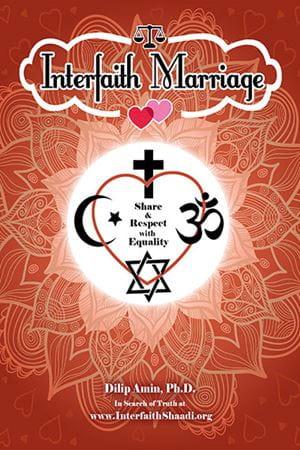
In the Western world, new adults have the opportunity to date individuals from other faiths during their college years. Therefore it should come as no surprise that in North America about a third[1] of the young generation of Dharmics (Hindus, Jains, Buddhists and Sikhs) marry Abrahamics (Christians, Jews and Muslims). This trend is expected to rise in the years ahead.
There is often a large gap between the expectations of parents and children about the child’s choice of a life partner, at least initially. Thus, when an Abrahamic life partner is selected, Dharmic new adults will frequently make decisions without prior advice, guidance, or consultation with their parents and vice versa.
It is safe to say that most youths are not sufficiently knowledgeable about others’ faiths and how they differ from their own faith. Further, parents are often ill equipped to guide their new adults in this critical transition, resulting in irrational arguments between generations.
In the predominantly first-generation immigrant Hindu and Muslim communities, some parents with unmarried children may look smugly at others whose child has an interfaith spouse without realizing that it could happen in their own home a few years down the road.
We need to recognize that interfaith marriages are a matter of chance, regardless of the religious training given in childhood. Parents of interfaith married couples also need to learn to live with a new reality of life.
Parents who have children in interfaith marriages are reluctant to publicly share their experience, resulting in a loss of critical knowledge for the benefit of each community. It is hoped that wealth of knowledge collected at InterfaithShaadi.org about complexities in interfaith marriages will be of value to many communities.
Interfaith marriages are a part of our modern life in America and we need to learn to be prepared for it. Several interfaith marriage issues need to be addressed such as:
- What will be the religion of children?
- A Dharmic must ask: is there any expectation of a religious “label” to be placed on the child(ren) by BBS (Baptism (Christian), Bris (Jewish) or Sunat (Islamic))?
- An Abrahamic must ask: will they have to be a part of the Hindu worship practice of puja and the display of Hindu Ishvara icons in the home?
- Will there be expectation of religious conversion of the groom/bride before marriage?
- What will be the names of children?
- Will there be circumcision for religious reason?
- Which religion will be followed for the funeral rites of the spouse and children by this marriage?
Not all interfaith spouses try to impose their religious beliefs/practices on their counterpart in marriage, but it is critical to find out the facts sooner rather than later. It is also important to recognize that despite all the potential marital pitfalls, a successful and fulfilling inter-religious marriage is possible. One effective way to achieve this is by not imposing one’s religious beliefs on the other partner.

